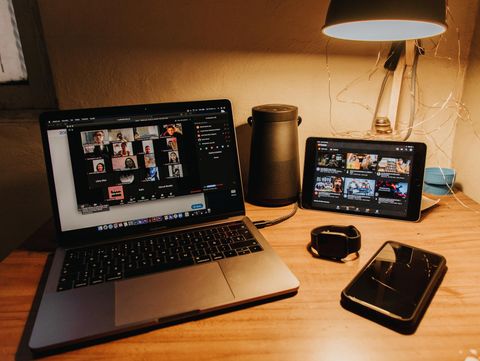A Whole Different Ball Game
April 23, 2020
A whole different ball game
You may have been doing okay as a leader, or even a leader of leaders, before Covid 19. You had it under control, your teams were strong…
But even leaders with the strongest teams are playing a different game now. Your teams are at home, playing individually, spread far and wide, perhaps scared and uncertain of their future, distractions at every turn.
Gone are the opportunities to pop into your office for a spot of advice, chat to a colleague during a coffee break, have those incidental conversations with you where you realise they're not doing well, recognise their discomfort and can provide reassurance; give them confidence. That's what good leaders do!
It's like having a probationary employee. They can seem okay for a month or two, and can hide the fact things are going wrong. But a few months in it becomes apparent they're out of their depth. Working under Covid-19 is like having a whole team on probation with screens and email filtering communications in a way that hides the cracks and gives a delayed reaction. Your team leaders may be worried about their jobs, feel cut off from casual communications with their peers, or with you. And when they're not coping, how do they control a team; all stressed, all working outside the framework of those easy office communications.
Research has shown that conversation in the workplace is an essential component of a healthy, dynamic and connected workforce. Talking creates trust, understanding and empathy. Tom Rath, in his book Vital Friends records that those with a best friend at work are seven times more likely to be engaged in their work.
So what happens when we're in lockdown, deprived of those everyday work conversations and the casual friendships that go with them?
We're about six weeks in now and some of the little stress cracks I mentioned earlier will be widening – and if you're not on top of it, major meltdown could be on the way.
When people are anxious – and who isn't during this crisis – they don't see things through the usual lens. And you as a leader, or leader of leaders, need to give them some extra stuff. Something to replace those incidental conversations when you sensed their problem and gave them a life-line; let them know they were appreciated.
Group meetings on Zoom and conference calls just don't cut it! Unless you're incredibly good at that stuff you're going to miss the small inferences and the self-doubt you'd pick up when you worked beside them.
Sometimes you have to make the time in the virtual world to sit back and have a private "coffee break" with them; structure conversations to check that everyone's doing okay.
Remember, your whole team no longer has the structure of the workplace. Distractions can range from the kids underfoot to household chores. Covid-19 is putting you in second place.
It's time to think differently. Covid 19 is different and the rules have changed. Match the help you need to yourself and seek out somebody who's used to working remotely; understands the technologies AND their shortcomings. Somebody who's helped businesses grow through difficult times.
And a final thought for those who were already struggling before Covid-19 – who were realising they didn't like their jobs very much. The bad news is that it's not going to get better!
It's time to get some coaching so you can get through this without losing your job – but it's also a time to look at your strengths. You can read more about this in our Blog called "A Time to Focus by clicking HERE.
Do some different stuff. If you haven't done professional mentoring, do it now. If you haven't used a coach, get one.
Sure, self-help is good, but chances are you really need the help of somebody whose been a leader or leader of leaders – and you need it more than ever in the Covid-19 "remote office".

The word "culture" derives from a French term, which in turn derives from the Latin "colere", which means to tend to the earth and grow, or cultivation and nurture. The workplace is not just a place for you to come and work, but it should also be a great place for you to grow and learn. When we refer to workplace culture, this could be referring to the workplace language used, attitudes at work, values and the way people interact. Did you know that workplaces generally have one of four different types of work culture? This is important because sometimes this internal culture is not a match for your own preferences and you could, in fact, be clashing with the internal culture from day one. A basic overview of the four types are: Clan Culture: is like one big family where everyone does things collaboratively and upholds similar commitment levels. The Hierarchy Culture: A more formal and very structured working culture with strict policies and procedures on the way things need to be done. The Market Culture: based around winning and achieving set goals and beating rivals, so strategies and measures are all based around meeting those goals and sales targets. And the Adhocracy Culture : is based around everyone being quite entrepreneurial and everyone is constantly looking for new strategies to improve the business. Understanding this, could you see that, say you came from a background, for example, in defence, and you started your career loving the set structure where everyone followed policies and procedures, and everyone knew their place and who their reporting officer was, then you moved into an Adhocracy culture which is about thinking outside the box and creating new ways, with most people on the same level, that you may struggle to assimilate with that culture and feel that you might not be “clicking” with the job? Your skills could match up to the job duties yet there would be a misalignment with the workplace environment (culture) and you may not thrive there. If you're the owner or manager of a business understanding the type of your internal culture is a powerful way to employ. If you can include more about the culture of your business in the job advertisement then you could attract better applicants who are a better match to the synergy of your team.

We've put together a list of some of our favourite reads when it comes to leadership, career growth and getting the best out of your team. This list is not extensive yet a great start to look back on some new and old teachings. The best part with most of these listed, they are short yet powerful reads and now with the fantastic introduction of Audible books you can now download these books and listen to them in the car or on the way to work (turn your dead time into learning time). Of course, once you've had a read of these books let us know what you thought of them by sending us a quick email OR share with us one of your favourite leadership books for us to add to the list.

If there's a legacy I'd like to leave before I shuffle off my mortal coil, it's having empowered others to become better leaders. And that brings me to the topic of this blog – defining what makes a great leader. I've encountered many of them in my travels. People doing amazing work, inspiring others and creating world-class teams working towards a common goal, everyone self-driven and proactive. Alas, it is not always like this! All too often I've been hired to find out why organisations are not working effectively; why there are barriers and friction, and nobody can quite put their finger on the cause. In most instances, the problems started at the top – and you can imagine how popular that made me, pointing out that the people who'd hired me to fix their dysfunctional teams were the ones that needed my attention first.





